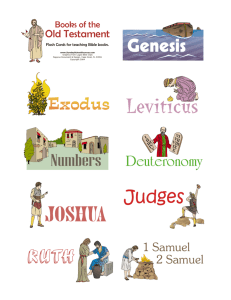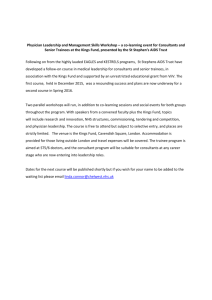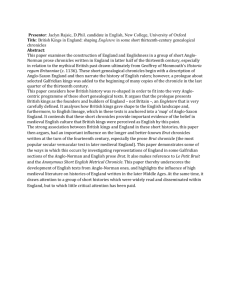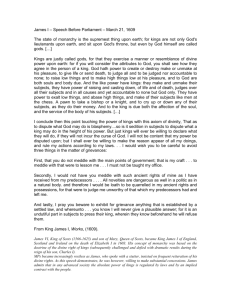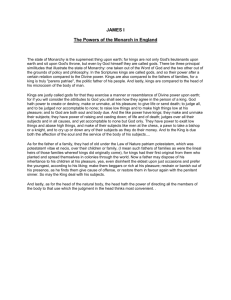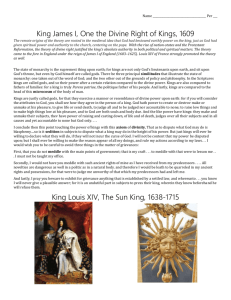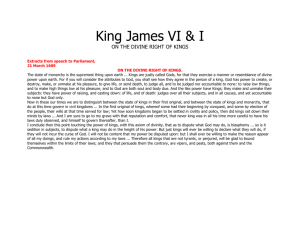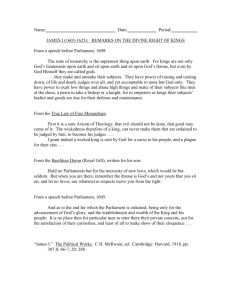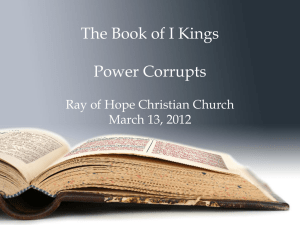a The Story of the Kings of Israel and Judah 1 and 2 Kings
advertisement
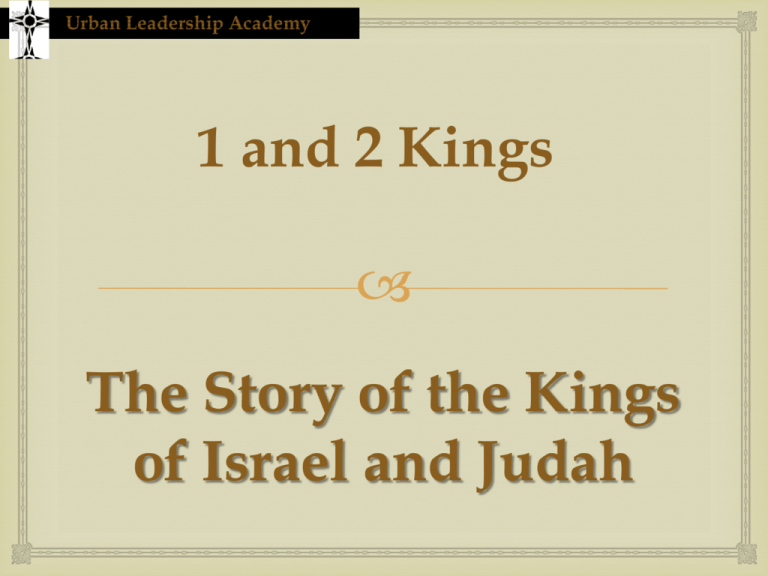
Urban Leadership Academy 1 and 2 Kings The Story of the Kings of Israel and Judah Urban Leadership Academy 1 and 2 Kings Key Ideals Kingship – good and evil The prophetic voice as the royal conscience Worship – Yahwism vs. Baalism Covenant blessings (repentance and restoration and curses (Judgment and exile) Urban Leadership Academy Purpose Statement 1 and 2 Kings The books of Kings continue the story of kingship begun in Samuel Primary purpose is to record the “covenant failure” of the Hebrew united and divided monarchies. The biblical narrative implicitly balances the notion of God’s sovereignty and the reality of human freedom and declares that God was justified in exiling God’s people for the failure of the kings of Israel and Judah to uphold the ideals of the Davidic covenant. Urban Leadership Academy 1 and 2 Kings The Presence of God The books of Kings report God’s presence manifest in the form of a cloud of glory filling Solomon’s temple at its dedication (1 Kings 8:10-11). The reality of the divine presence associated with the Jerusalem sanctuary is accented in the foil of divine abandonment of the temple and the fall of the Hebrew monarchies and the exile of God’s people (cf. Ezek. 10:18-19) Urban Leadership Academy 1 and 2 Kings Major Themes Assessment of King Solomon Pre-classical and Classical Prophecy Dynastic Succession and Charismatic Leadership The Golden Calf Cult Urban Leadership Academy 1 and 2 Kings Assessment of King Solomon He was “loved by Yahweh” (2 Sam 12:24-25) Bestowed with the gift of wisdom (1 Kings 3) Brought unprecedented peace, wealth and prosperity, glory and splendor to Israel (1 Kings 10:14-29) Achieved international fame as a master builder (1 Kings 6:1-7:12) sage (1 Kings 10:23) An ardent student of the “arts and sciences” (1 Kings 4:29-34) Fell prey to the seductions of foreign women (1 Kings 11:1-3) Consumed by sensuality and materialism (Prov 5:1-14; 7:6-27) Idolatry (cf. 1 Kings 11:33 and 3:3) Urban Leadership Academy 1 and 2 Kings instituted by Policies and Programs Solomon: 1. Political alliance to foreign nations by marriage (1 Kings 3:1-2) 2. Tendencies toward religious syncretism in an effort to appease both the Canaanite and Hebrew populations in Palestine (1 Kings 11:1-8) 3. The geographical realignment of Israel into twelve administrative districts in an attempt to erase old tribal boundaries and loyalties (1 Kings 4:7-19) 4. The proliferation of state bureaucracy (1 Kings 4:22-28) Urban Leadership Academy 1 and 2 Kings Policies and Programs instituted by Solomon: 5. Lavish building projects that required slave labor among both the non-Hebrew and Hebrew residents of Israel (1 Kings 9:15-22; cf. 5:13-18 and 12:9-11) 6. The influx of pagan political and religious ideology in Jerusalem as a result of international trade and commerce (cf. 1 Kings 9:26-28; 10:22-29) 7. The revolt of satellite states of Solomon’s military power waned (with the ensuing loss of foreign tribute as revenue compensated for by increased taxation of the Israelites (1 Kings 11:9-25) Urban Leadership Academy 1 and 2 Kings Pre-classical and Classical Prophecy Kings provide biography of the personality and ministry of the non-writing prophets to the Hebrew kingship Pre-classical prophecy (non-writing prophets) The pre-classical prophets predate the classical prophets Prophecy to the royal family Message was of judgment and national destruction for covenant violation Urban Leadership Academy 1 and 2 Kings Pre-classical and Classical Prophecy Classical prophecy (writing prophets) Preserved in oracle form Symbolic behavior rather than miraculous events Message was to political and religious leaders of the monarchies as well as the populace Prophetic ministry expanded to the surrounding nations Urban Leadership Academy 1 and 2 Kings Dynastic Succession and Charismatic Leadership Associated with Judah kingship Monarch’s death the throne passed to the eldest son Aging kings appointed his successor or arranged a tenure of co-regency for his successor Urban Leadership Academy 1 and 2 Kings Dynastic Succession and Charismatic Leadership Northern kingdom combined dynastic succession and charismatic leadership model of the Hebrew Judges God raised up gifted and able male or female leaders to address political and religious crises Leaders empowered by the Holy Spirit Power manifested by extraordinary physical strength, courage, and spiritual zeal Charismatic leaders were not passed down from generation to the next Urban Leadership Academy 1 and 2 Kings Cult The Golden Calf Term “calf” connoting any male or female animal of the bovine family Bull god symbol from Egyptians Apis – sacred bull incarnation of the son of Osiris Fertility deity who gave life, health, and strength to the king and agricultural and reproductive fertility to the kingdom Urban Leadership Academy 1 and 2 Chronicles The Story of Kingship from a Priestly Perspective Urban Leadership Academy 1 and 2 Chronicles Key Ideals The retelling of the past to inspire hope in the present The reigns of David and Solomon idealized The centrality of temple worship The validation of the priests and Levites as community leaders Urban Leadership Academy 1 and 2 Chronicles Purpose Statement Retell the story of the God of history, more specifically the biography of the God of Israel’s history—especially Davidic kingship The sermon-like narrative is a theology of hope for the post-exilic Hebrew community, affirming that God is faithful and God will restore Davidic kingship and fulfill God’s promises to raise up a shepherd-king like David to rule over Israel (cf. Jer. 33:15-16; Ezek. 34:23-24) Urban Leadership Academy 1 and 2 Chronicles The Presence of God Chronicles teach that God’s presence is more important than a king’s presence Obedience to God is more important than political power and national status The centrality of the temple, the proper worship of Yahweh, and the authoritative role of the priests and Levites underscored the divine presence associated with Solomon’s temple as a house of prayer (cf. 2 Chron. 5:14; 6:40) Urban Leadership Academy 1 and 2 Chronicles Major Themes Worship in the Old Testament The Chronicler’s Vocabulary Typology Urban Leadership Academy 1 and 2 Chronicles Testament Worship in the Old Corporate & Individual worship (1 Chron. 31:20-21) Ordered and priestly led worship according to liturgical calendar (2 Chron. 35:1-19) Response to Yahweh’s steadfast lovingkindness (1 Chron. 16:28-34; c.f. Hezekiah’s celebration of 2 Passovers in one year (2 Chron. 30:13-22) Private worship (1 Chron. 16:23-27) Public Worship (1 Chron. 16:36; 29:9; 2 Chron. 5:2-14; 6:3-11) Urban Leadership Academy 1 and 2 Chronicles is motivated by fear of True worship of Yahweh the Lord (2 Chron. 2:9; 2 Chron. 19:9) Active experience – not passive Acknowledgement of God’s worth and reverence and adoration included following gestures: Drink offerings and libations Presentation of sacrifices and burnt offerings Bowing down Burning incense Giving thank offerings and votive gifts Prayer in various postures Fasting Ritual washing Observing the great religious festivals” (2 Chron. 29:1219, 31-36, 42:13-27; 34:12; 22-28) Urban Leadership Academy 1 and 2 Chronicles Worship as Word: Word of oath taking Praise and thanksgiving Of prayer Joyful song Confession Liturgical responses by congregation (cf. 1 Chron. 15:19; 16:4, 9, 23,36,40; 17:16-27; 2 Chron. 15:15) Worship as a Place In the temple (2 Chron. 5:2-7:10) Not limited by bounds of time or confines of “scared place” (2 Chron. 6:12-23) Urban Leadership Academy 1 and 2 Chronicles The Chronicler’s Vocabulary Repentance – Yahweh’s ability to turn from wrath in face of repentance Balance of “internal” and “external” “rejoicing and serving God with pure heart (1 Chron. 28:9; 29:9) Generous; giving and faithfulness (1 Chron. 29:1-9, 14, 17; 2 Chron. 19:9) Thankful and joyful celebration and worship (1 Chron. 16:4-7; 22-30; 29:13) Urban Leadership Academy Typology 1 and 2 Chronicles Method of exegesis – establishes historical correspondence between Old Testament events, persons, or objects and ideas by foreshadowing or prototype Priesthood of Melchizedek (Gen 14:1724) prototype of Jesus (Heb 7:1-22) Tabernacle symbols of foreshadowing Christ’s eternal (Heb. 9:6-14) David as a 2nd Moses Solomon as 2nd Joshua Urban Leadership Academy Next Week The Historical Books – Part V Ezra – Nehemiah (pgs 329-344) Esther (pgs 347-355) Archaeology and the Old Testament Review for Final Exam Reading Assignment: Pages 329 thru 370 (36 PAGES)
